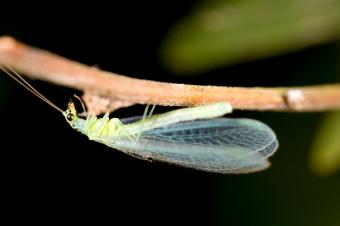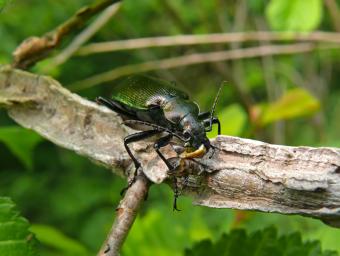Many Beneficial Garden Bugs

Laydybug Larvae

Tachnid Fly

Carpenter Bee

Lacewing

Praying Mantis

Dragonfly

Parasitic Wasps

Assassin Bugs

Ground Beetle

Syrphid Fly

Earwig

© 2024 LoveToKnow Media. All rights reserved.

Of all the beneficial garden bugs, ladybugs are the most well-known. There are, in fact, many more that will help keep your garden healthy and pest-free.
You might be surprised at what bugs are actually helpful! Enjoy this small sampling of the many beneficial insects in your garden.These first four images are courtesy of Allison Mia Starcher, author of Good Bugs for Your Garden.

Like Ladybugs, Ladybug larvae vary in coloration. They can be black and red or black and yellow. If you see these little guys in your garden, be happy! They are working hard to keep your garden aphid free.

The Tachinid Fly helps to control tomato hornworms. They do this by laying eggs in insects. Their larvae eat the infected host and kills it. Tachinid flies also control cabbage lopers, potato beetles and corn borers.

While sometimes regarded as pests, the Carpenter bee is actually an important pollinator. There are over 500 species of Carpenter Bee. Males cannot sting and females are too gentle to sting unless provoked.

Brown and green Lacewings have larvae that eat aphids, caterpillars, mites and mealybugs. You can attract them by growing dill, sunflowers, dandelions and other flowers.

The Praying Mantis will eat anything it can catch in its claspers. They are the ultimate hunters but sometimes will eat beneficial garden bugs along with the pests. Even so, they are good to have in your garden.

Dragonflies are the gems of your garden with their many beautiful colors. They are also useful because they eat mosquitoes, aphids and other garden pests.

There are many types of parasitic wasps. This one is an Ichneumon wasp. They kill aphids, tomato hornworms, cutworms and other insects in order to lay their eggs in them.

The Assassin bug is aptly named. It eats flies, mosquitoes, beetles and caterpillars.

Ground beetles are a helpful garden friend as well. They'll eat cutworms and mole crickets. They may pinch if caught and will sometimes emit a foul odor. However, if you leave them alone to do their job, you won't have a problem.

Syrphid flies do not sting even though they resemble stinging bees. Their larvae will eat aphids in your garden.

The Earwig has a bad reputation but they will not harm people. They eat chinch bugs and mole crickets.
Learn to identify some of the bad bugs by seeing Identifying Garden Pests.